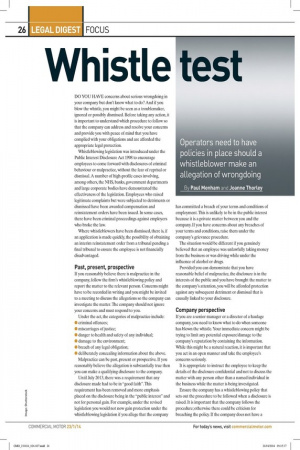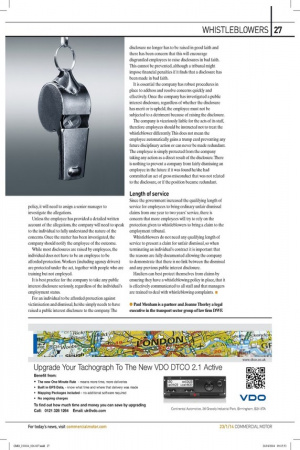Whistle
Page 23

Page 24

If you've noticed an error in this article please click here to report it so we can fix it.
Operators need to have policies in place should a whistleblower make an allegation of wrongdoing By Paul Menham and Joanne Thorley
DO YOU HAVE concerns about serious wrongdoing in your company but don't know what to do? And if you blow the whistle, you might be seen as a troublemaker, ignored or possibly dismissed. Before taking any action, it is important to understand which procedure to follow so that the company can address and resolve your concerns and provide you with peace of mind that you have complied with your obligations and are afforded the appropriate legal protection.
Whistleblowing legislation was introduced under the Public Interest Disclosure Act 1998 to encourage employees to come forward with disclosures of criminal behaviour or malpractice, without the fear of reprisal or dismissal. A number of high-profile cases involving, among others, the NHS, banks, government departments and large corporate bodies have demonstrated the effectiveness of the legislation. Employees who raised legitimate complaints but were subjected to detriments or dismissed have been awarded compensation and reinstatement orders have been issued. In some cases, there have been criminal proceedings against employers who broke the law.
Where whistleblowers have been dismissed, there is, if an application is made quickly, the possibility of obtaining an interim reinstatement order from a tribunal pending a final tribunal to ensure the employee is not financially disadvantaged. Past, present, prospective
If you reasonably believe there is malpractice in the company, follow the firm's whistleblowing policy and report the matter to the relevant person. Concerns might have to be recorded in writing and you might be invited to a meeting to discuss the allegations so the company can investigate the matter. The company should not ignore your concerns and must respond to you. Under the act, the categories of malpractice include: • criminal offences; • miscarriages of justice; • danger to health and safety of any individual; • damage to the environment; • breach of any legal obligation;
• deliberately concealing information about the above.
Malpractice can be past, present or prospective. If you reasonably believe the allegation is substantially true then you can make a qualifying disclosure to the company. Until July 2013, there was a requirement that any disclosure made had to be in "good faith". This requirement has been removed and more emphasis placed on the disclosure being in the "public interest" and not for personal gain. For example, under the revised legislation you would not now gain protection under the whistleblowing legislation if you allege that the company
has committed a breach of your terms and conditions of employment. This is unlikely to be in the public interest because it is a private matter between you and the company. If you have concerns about any breaches of your terms and conditions, raise them under the company's grievance procedure.
The situation would be different if you genuinely believed that an employee was unlawfully taking money from the business or was driving while under the influence of alcohol or drugs.
Provided you can demonstrate that you have reasonable belief of malpractice, the disclosure is in the interests of the public and you have brought the matter to the company's attention, you will be afforded protection against any subsequent detriment or dismissal that is causally linked to your disclosure. Company perspective
If you are a senior manager or a director of a haulage company, you need to know what to do when someone has blown the whistle. Your immediate concern might be trying to limit any potential exposure/damage to the company's reputation by containing the information. While this might be a natural reaction, it is important that you act in an open manner and take the employee's concerns seriously.
It is appropriate to instruct the employee to keep the details of the disclosure confidential and not to discuss the matter with any person other than a named individual in the business while the matter is being investigated. Ensure the company has a whistleblowing policy that sets out the procedure to be followed when a disclosure is raised. It is important that the company follows the procedure; otherwise there could be criticism for breaching the policy. If the company does not have a
policy, it will need to assign a senior manager to investigate the allegations.
Unless the employee has provided a detailed written account of the allegations, the company will need to speak to the individual to fully understand the nature of the concerns. Once the matter has been investigated, the company should notify the employee of the outcome.
While most disclosures are raised by employees, the individual does not have to be an employee to be afforded protection. Workers (including agency drivers) are protected under the act, together with people who are training but not employed.
It is best practice for the company to take any public interest disclosure seriously, regardless of the individual's employment status. For an individual to be afforded protection against victimisation and dismissal, he/she simply needs to have raised a public interest disclosure to the company. The
disclosure no longer has to be raised in good faith and there has been concern that this will encourage disgruntled employees to raise disclosures in bad faith. This cannot be prevented, although a tribunal might impose financial penalties if it finds that a disclosure has been made in bad faith.
It is essential the company has robust procedures in place to address and resolve concerns quickly and effectively. Once the company has investigated a public interest disclosure, regardless of whether the disclosure has merit or is upheld, the employee must not be subjected to a detriment because of raising the disclosure.
The company is vicariously liable for the acts of its staff therefore employees should be instructed not to treat the whistleblower differently. This does not mean the employee automatically gains a trump card preventing any future disciplinary action or can never be made redundant. The employee is simply protected from the company taking any action as a direct result of the disclosure. There is nothing to prevent a company from fairly dismissing an employee in the future if it was found he/she had committed an act of gross misconduct that was not related to the disclosure, or if the position became redundant. Length of service
Since the government increased the qualifying length of service for employees to bring ordinary unfair dismissal claims from one year to two years' service, there is concern that more employees will try to rely on the protection given to whistleblowers to bring a claim to the employment tribunal.
Whistleblowers do not need any qualifying length of service to present a claim for unfair dismissal, so when terminating an individual's contract it is important that the reasons are fully documented allowing the company to demonstrate that there is no link between the dismissal and any previous public interest disclosure. Hauliers can best protect themselves from claims by ensuring they have a whistleblowing policy in place, that it is effectively communicated to all staff and that managers are trained to deal with whistleblowing complaints. • • Paul Menham is a partner and Joanne Thorley a legal executive in the transport sector group of law firm DWE












































